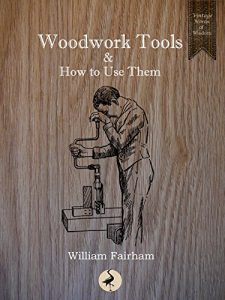All woodworkers know that tools appropriate for the job in hand improve the quality of the work and render the process easier and more enjoyable. This Vintage Words of Wisdom title, published in 1925, provides a comprehensive guide to hand tools for woodworking. In addition the author provides advice and guidance as to the best use of each tool to ensure both efficiency and effectiveness. Woodwork Tools and How to Use Them is therefore both a useful reference and a very practical woodworking book.
In the late twentieth century the main change for the amateur woodworker has been the introduction of numerous power tools for carpentry. Obviously this volume pre-dates the many electric drills, sanders, saws and cutters that have become a common feature of the modern workshop. Nonetheless the fundamentals outlined in Woodwork Tools and How to Use Them remain as relevant now as they were almost a century ago and there is much sound advice for the amateur carpenter and hobbyist of today. Also, of course, some of us have inherited tools from fathers and grandfathers, or have picked up vintage woodworking tools from market stalls. There is a certain pleasure and satisfaction from using and caring for family heirlooms or tried and tested antique woodworking tools that were made to last. A further characteristic of this book is the idea of self-sufficiency – making your own plumb line, grinding and sharpening the blade of your plane and adapting tools to perform more specialist tasks. Concepts accepted by our forefathers but the easy availability of replacement blades and bits today has made us more inclined simply to buy a new one.
The text is supported by a wealth of detailed drawings that illustrate clearly all the tools, their use and maintenance. Woodwork Tools and How to Use Them offers wisdom from the past that remains just as relevant today and should enhance the enjoyment that any woodworker gets from their hobby.
In the late twentieth century the main change for the amateur woodworker has been the introduction of numerous power tools for carpentry. Obviously this volume pre-dates the many electric drills, sanders, saws and cutters that have become a common feature of the modern workshop. Nonetheless the fundamentals outlined in Woodwork Tools and How to Use Them remain as relevant now as they were almost a century ago and there is much sound advice for the amateur carpenter and hobbyist of today. Also, of course, some of us have inherited tools from fathers and grandfathers, or have picked up vintage woodworking tools from market stalls. There is a certain pleasure and satisfaction from using and caring for family heirlooms or tried and tested antique woodworking tools that were made to last. A further characteristic of this book is the idea of self-sufficiency – making your own plumb line, grinding and sharpening the blade of your plane and adapting tools to perform more specialist tasks. Concepts accepted by our forefathers but the easy availability of replacement blades and bits today has made us more inclined simply to buy a new one.
The text is supported by a wealth of detailed drawings that illustrate clearly all the tools, their use and maintenance. Woodwork Tools and How to Use Them offers wisdom from the past that remains just as relevant today and should enhance the enjoyment that any woodworker gets from their hobby.






